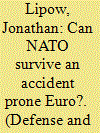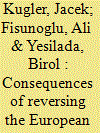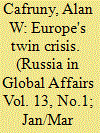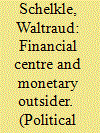| Srl | Item |
| 1 |
ID:
114689


|
|
|
|
|
| Publication |
2012.
|
| Summary/Abstract |
The European Monetary Union (EMU) is inherently unstable, and will be prone to repeated financial and fiscal crises. These crises pose a clear threat to NATO security and the political institutions of Alliance member states. There is no definitive way to eliminate the risks posed by monetary union, but straightforward reforms in EMU sovereign debt management represent a low-cost near-term means of mitigating these risks. With EMU nations facing a seeming leadership vacuum, it is well within NATO purview to press for adoption of such reforms.
|
|
|
|
|
|
|
|
|
|
|
|
|
|
|
|
| 2 |
ID:
137819


|
|
|
|
|
| Summary/Abstract |
Today, financial crisis once again threatens the unity among member states and future of the European Union. The magnitude of the problem is so grave that observers and analysts have concluded a big decision must be made regarding fiscal union (thus political union) to save EMU. “Is this really the end of the road for Eurozone?” Using Power Transition theory, our analysis shows that trust and relative political capabilities are essential to build a stable Union. While it is clear that the center of global politics is shifting away from Europe and the United States to the Asian giants—the transition from West to East can be effectively planned so that the future units are satisfied with each other rather than distrustful, dissatisfied, and contentious. The slowdown of integration is not simply a regional problem with serious consequences for the economic stability of Europe. Far more importantly, our analysis suggests that the process of integration that has reduced tensions within a region previously characterized by major wars may be declining and that this in and of itself could reset the stage not only for regional confrontations but increase the likelihood that global wars may once more be considered as means to solve disputes. The European Union cannot afford to move from the cooperative contest to a confrontational one where solutions are arrived at by force rather than reason. Therefore, the challenge for European leaders is to resolve the current crisis in the EMU and build upon it a reinvigorated union that once more provides a path for complete regional integration.
|
|
|
|
|
|
|
|
|
|
|
|
|
|
|
|
| 3 |
ID:
013355


|
|
|
|
|
| Publication |
Nov-Dec 1997.
|
| Description |
60-73
|
|
|
|
|
|
|
|
|
|
|
|
|
|
|
|
| 4 |
ID:
008173


|
|
|
|
|
| Publication |
April 1995.
|
| Description |
75-78
|
|
|
|
|
|
|
|
|
|
|
|
|
|
|
|
| 5 |
ID:
138206


|
|
|
|
|
| Summary/Abstract |
The crisis of the eurozone has accelerated processes of uneven development and political fragmentation in Europe. Once celebrated as a dramatic forward movement in European regional integration, the monetary union has evolved under German leadership into what has been aptly described as "eurozone fiscal colonialism." The Franco-German partnership - the motor force of integration since the early 1950s - has shattered amid Frances resentment of German-imposed fiscal rules and declining competitiveness. Germany's authority over the eurozone is virtually unchallenged. As the EU's response to the war in Ukraine vividly illustrates, Germany has now also emerged as the predominant political power in the EU.
|
|
|
|
|
|
|
|
|
|
|
|
|
|
|
|
| 6 |
ID:
145553


|
|
|
|
|
| Summary/Abstract |
The UK's negotiating position in the area of ‘economic governance’ started from the assumption that there is a deep dividing line between insiders and outsiders of the ‘euro zone’. To protect the outsiders, the UK government did not ask for a veto, but for a safeguard mechanism that can postpone a decision in the euro area. This is exactly what David Cameron achieved in the negotiations with Council President Tusk. This article explains why the UK demands were so modest. Key is the peculiar situation of the UK being the major financial centre for a currency union to which it does not belong. Hence, the UK taxpayer needs protection from the City, and EU membership has helped to provide this. There is not much else a UK government could ask for.
|
|
|
|
|
|
|
|
|
|
|
|
|
|
|
|
| 7 |
ID:
021032


|
|
|
|
|
| Publication |
2002.
|
| Description |
81-92
|
|
|
|
|
|
|
|
|
|
|
|
|
|
|
|
| 8 |
ID:
089894


|
|
|
|
|
| Publication |
2009.
|
| Summary/Abstract |
The existence of the euro-area has lowered the costs emanating from the autumn 2008 financial crisis for weak euro-area economies. For the Scandinavian euro-outsiders, the financial crisis awoke a public discussion about the pros and cons of the euro. This is just natural in a situation of crisis. Owing to their good economic standing, however, the Scandinavian euro-outsiders have not, on the whole, been worse off outside the euro-area than EU member states inside it. One reason may be the level of micro-innovation. Over the past 10 years, a considerable amount of experience has been accumulated among the euro-outsiders. Innovative ways have been found to compensate for non-membership of the euro-area. In fact, it seems as if the special status of the semi-permanent euro-outsiders, such as Denmark and Sweden, initially has worked as a catalyst for innovation among civil servants and other stakeholders, thereby contributing to innovation in the entire public sector in these countries. Somehow this stands in sharp contrast to the reform rhythm among the euro-insiders.
|
|
|
|
|
|
|
|
|
|
|
|
|
|
|
|
| 9 |
ID:
142892


|
|
|
|
|
| Summary/Abstract |
Within a year of the publication in 1987 of my historical account of the shifting priorities in Europe’s monetary and financial integration, dramatic first steps in a process of major changes in both areas were taken: In June 1988, the then 12 members states of the European Economic Community committed themselves to removing the residual controls on capital flows within a short time scale. And, in that same month, the European Council of Heads of State and Governments “confirmed the objective of progressive realization of economic and monetary union” and set up a committee, largely composed of national central bank governors, with Jacques Delors, then President of the European Commission as Chairman. The “Delors Report” of 1989 formed a stepping stone to the Maastricht Treaty, adopted at the end of 1991, and to the start of a common currency for 11 member states only seven years later. The scope and the speed of the process came as a major surprise, even to those most convinced of its net benefits, among whom this author has to be counted. Why did this strong momentum develop? And, in retrospect, would a more steady pace have been preferable?
|
|
|
|
|
|
|
|
|
|
|
|
|
|
|
|
| 10 |
ID:
056695


|
|
|